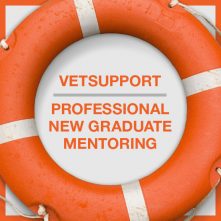Well, first of all – CONGRATULATIONS! Your hard work and dedication over many years has led you to this point – the culmination of what for many of us, was a childhood dream – to be able to help animals and improve their quality of life. You will have forged deep connections with your peers and your brains will be packed with all of the knowledge that a vet degree provides. The years ahead hold much promise and excitement for you.
But what now?
Up until this point, your primary focus has been on achieving the big, hairy audacious end goal of being a vet. Whilst you set the end goal, the pathway to achieving it lay in jumping through all the hoops (think exams and assessments) that other people decided were important for you. In the process of hoop-jumping, you may well have created some habits of thinking and behaving that will not be helpful to you as you move into the profession.
From my point of view, the habitual dangers lie in two areas;
You may have got into the habit of doing what other people expect of you. This is not a recipe for satisfaction and career success. It is time to make a transition to being self-directed and negotiating a career that has meaning and fulfillment for you.
How will you do that?
With your eye on the end goal, anything that got in the way of passing the next assessment may have been discarded or downplayed – thrown to the side with the thought that this can be picked back up later. Maybe this included self-care and the development of your non-technical competencies.
How do you think your habits of self-care will support your transition to work?
Do you feel confident that you have the necessary base-line of non-technical competencies to allow you to effectively utilize your clinical skills and knowledge?
Or do you have a plan to upskill?
 Graduation is now imminent. Later has come.
Graduation is now imminent. Later has come.
It’s time to redirect your focus. It’s time to take personal responsibility for your career choices and pathway. It’s time to take a more holistic approach to your ongoing personal and professional development.
And as you prepare to make this monumental move into the veterinary workforce, my questions for you are three-fold?
1. What sort of vet do you want to be?
What is important to you? What do you want to stand for as a vet, as a team member, with your boss, with clients, with family, friends and community? What are your values?
2. What sort of work is going to suit you best?
What do you love about work? What do you find easy and energizing? When do you lose track of time? Where can you make the best use of your strengths and interests?
3. What sort of workplace culture will suit you best?
Do you like a big team or a smaller one? What do you want the teamwork to look like? How are people’s contributions recognized and rewarded? Are team members thoughts and opinions heard and acted on? Is work considered to be a part of life rather than being life?
There are many questions to consider.
They are all big questions.
Answering them takes time and reflection.
Answering them creates self-awareness.
Self-awareness is at the centre of the veterinary employability framework created by the vetset2go project. This framework outlines the “personal and professional capabilities that enable a veterinarian to gain employment, and develop a professional pathway that achieves satisfaction and success” (https://www.vetset2go.edu.au/).
Self-awareness allows us to negotiate a career that is personally congruent – one that is consistent with our values and beliefs and the way we want to live our life. It allows us to live a life that matters. It allows us to achieve satisfaction and success.
How are you going to grow your self-awareness and achieve long-lived satisfaction and success?
 Together with Dr Cathy Warburton of MakeHeadway, we’ve put together the VetSupport Mentoring Program to ensure new graduates have the right tools to navigate their way around the workplace. Smoothly transition into work by knowing you have a safe, private and supportive platform to share your successes and concerns with a group of your peers as well as Cathy. This program promotes resilience and personal growth for improved job satisfaction, health and happiness. Did you know that happier people earn more?
Together with Dr Cathy Warburton of MakeHeadway, we’ve put together the VetSupport Mentoring Program to ensure new graduates have the right tools to navigate their way around the workplace. Smoothly transition into work by knowing you have a safe, private and supportive platform to share your successes and concerns with a group of your peers as well as Cathy. This program promotes resilience and personal growth for improved job satisfaction, health and happiness. Did you know that happier people earn more?
For more information, check out the VetSupport Brochure. If you’re interested in registering or have an employee who could benefit from the support, head here. Places are limited!
Written by Dr Cathy Warburton @ MakeHeadway
